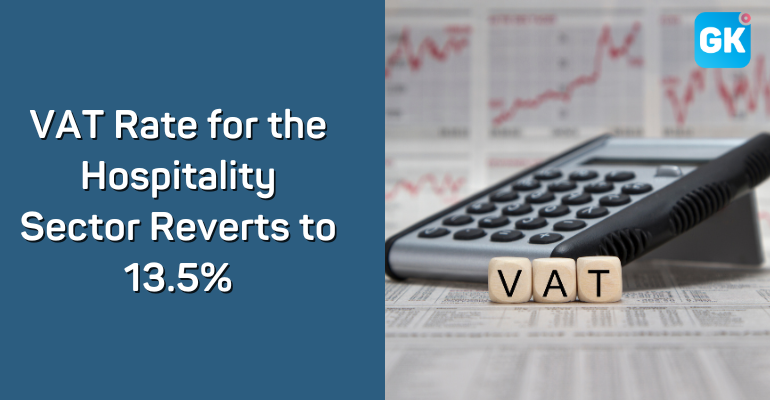VAT Rate for the Hospitality Sector Reverts to 13.5%

VAT Rate for the Hospitality Sector Reverts to 13.5%
In a significant development that has already taken place for businesses primarily operating in the tourism and hospitality sector, the Irish Value Added Tax (VAT) rate underwent a change. The VAT rate, which had been temporarily reduced to 9% in response to the challenges posed by the COVID-19 pandemic, has reverted to 13.5% on the 1st of September, 2023.
What Goods and Services are Affected?
This VAT rate adjustment applies to a range of goods and services, including:
- Certain food and beverages are served in restaurants, takeaways, and catering establishments.
- Admissions to specific attractions such as cinemas, museums, and exhibitions.
- The provision of accommodations in hotels, guesthouses, and similar establishments.
- Hairdressing services.
It’s important to note that certain categories such as printed matter like magazines and periodicals, and sporting facilities provided by profit-making bodies, will continue to be subject to the 9% VAT rate. Other goods and services under different VAT rates remain unaffected by this change.
Implications for Businesses:
While the VAT will only become due to the Revenue on November 23 when businesses file their September/October 2023 VAT returns, it is crucial to act promptly to ensure commercial protection and compliance with the updated requirements.
Here’s a checklist of considerations for relevant businesses:
1. Systems: Update systems to accommodate the VAT rate change. This may involve adjusting tax codes and tax determination logic in various systems, including point-of-sale systems and back-end finance and ERP systems.
2. Pricing: Assess the impact on pricing, as the VAT amount included in prices may represent a net cost to customers, particularly in cases where goods and services are supplied to consumers or are non-deductible supplies for VAT purposes.
3. Timing: Determine the VAT “tax point” for each supply accurately. This is crucial, especially when payments or invoices span the period of the VAT rate change.
4. Contracts: Review existing contracts to confirm whether prices were agreed upon on a VAT-exclusive or VAT-inclusive basis.
5. Mixed Supplies: If your business offers packages that include goods and services subject to various VAT rates (e.g., meal deals or hotel packages), ensure that any blended VAT rates are recalculated to account for the increased rate on relevant supplies.
6. Credit Notes: Be prepared to issue credit notes if necessary, particularly for invoices issued before the VAT rate change.
7. Warehoused VAT Debts: Businesses that have availed themselves of the COVID-19 debt warehousing scheme offered by Revenue should ensure the correct VAT rate is applied to meet the scheme’s conditions.
Get in Touch:
This change in the Irish VAT rate is significant for businesses in the tourism and hospitality sectors. Please don’t hesitate to reach out to us for guidance:


